2025 California Parents Report their Fears and Hopes for AI







The rapid emergence of generative AI technologies, such as ChatGPT, has captured public attention, fueling widespread concerns about the potential negative effects of AI on the safety, learning, and development of youth. As AI becomes more prevalent in classrooms and homes, parents and educators are eager for guidance on how to navigate this rapidly evolving landscape safely and responsibly Policymakers and product developers need evidence-based guidelines to develop and regulate AI technologies in ethical and developmentally appropriate ways. Understanding AI's role in the lives of children and adolescents is timely and essential to support these efforts.
To address these questions, we rapidly fielded a poll of 2,143 adults across the state of California, including 870 parents and guardians of children aged 0 to 17 years Our results provide a snapshot of public perceptions, trust, and early patterns of generative AI use among Californians.
Many Californians particularly those who are parents of children under 18, younger, and college educated are open to the opportunities generative Al offers for children's learning and future careers. However, concerns remain about its potential risks, including impacts on children’s problem-solving abilities and academic integrity
Children's use of generative Al tools varied by age, parental education, and household income, with greater usage reported for adolescents versus younger children and for those from more advantaged families. At the same time, people do not yet trust any institutions to effectively regulate AI, not the government, not schools, and not technology companies

2,143 Californian adults completed the survey online
Data were collected using a hybrid sampling approach that blended a probability sample from the California voter file (n = 478) with a non-probability sample from a large online panel administered by Dynata (n = 1,665). Parents and guardians of children ages 0 through 17 (n = 870) were oversampled.
Participants reported on their perceptions of AI, including their support for the use of generative AI in schools and their trust in government and major technology companies to regulate AI Parents and guardians of children additionally answered questions about their children’s use of AI.
Data were collected by TrueDot between May 27 and June 2, 2025.
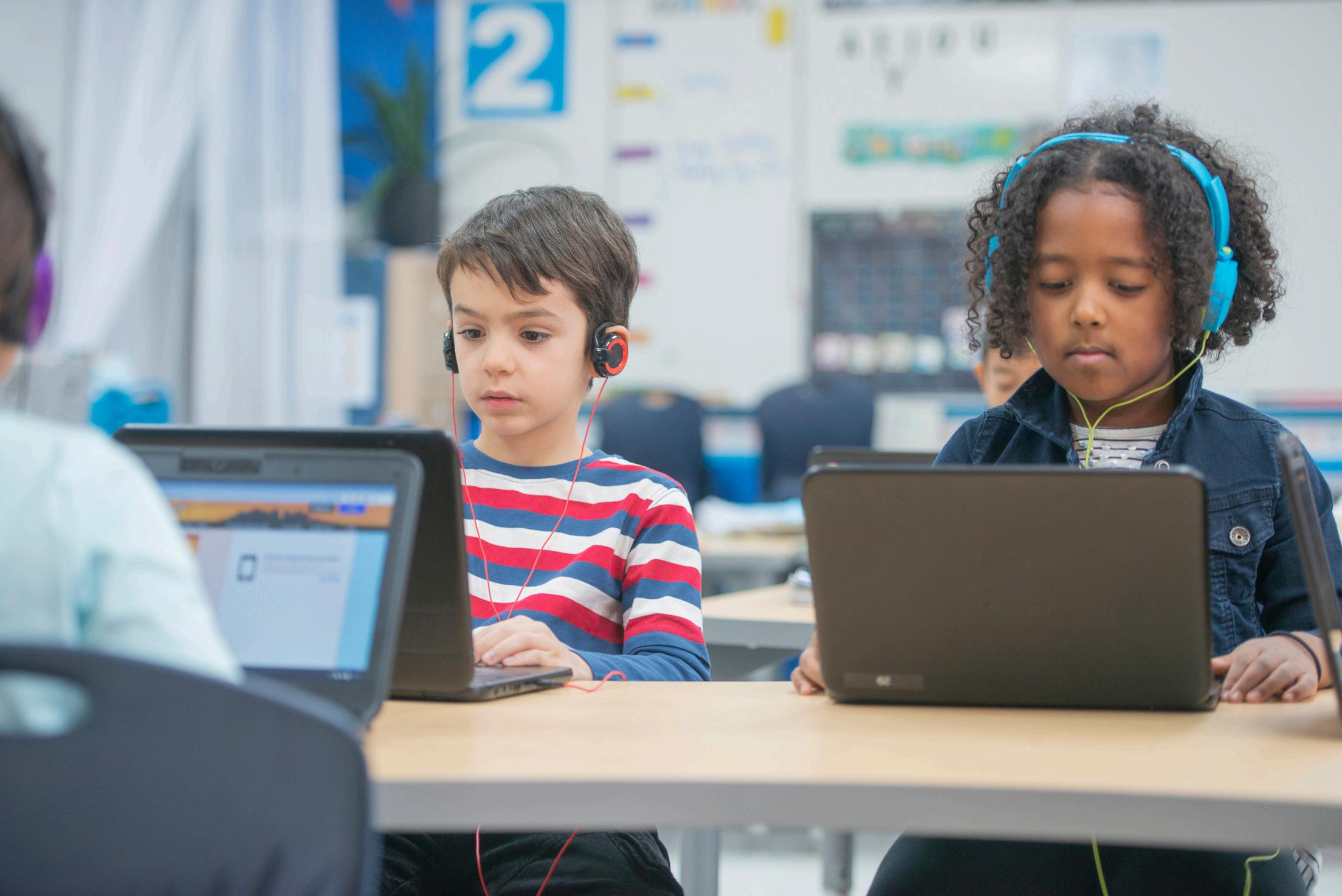
1 in 4 parents of adolescents report their child is using AI daily.
Among parents of adolescents (aged 1017), 1 in 4 reported their teen/tween was using generative AI tools like ChatGPT daily, while 15% said their teen/tween had never engaged with these technologies. In contrast, for younger children (aged 69), only 7% of parents reported daily use of generative AI tools, with 46% stating their children had never used them
Children's use of generative Al varied based on parental education and resources, with children in families with higher income, more parental education, and living in urban environments having higher reported use of generative Al compared to their peers Parents reported that these children were less likely to have never used generative AI (20-24% vs. 3350%) and more likely to use it a few times a week or more. For example, 51% of children with college-educated parents used generative AI several times a week to daily, as reported by their parents, compared to 29-38% of children whose parents had lower levels of education
How often does your child use apps that answer questions or write text, like ChatGPT, Copilot, or Gemini in the home, classroom, or elsewhere?
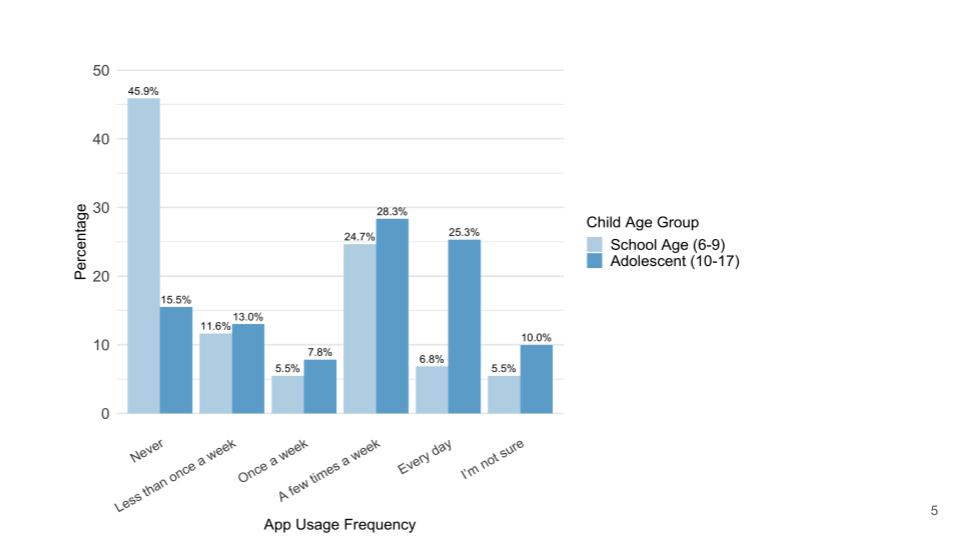
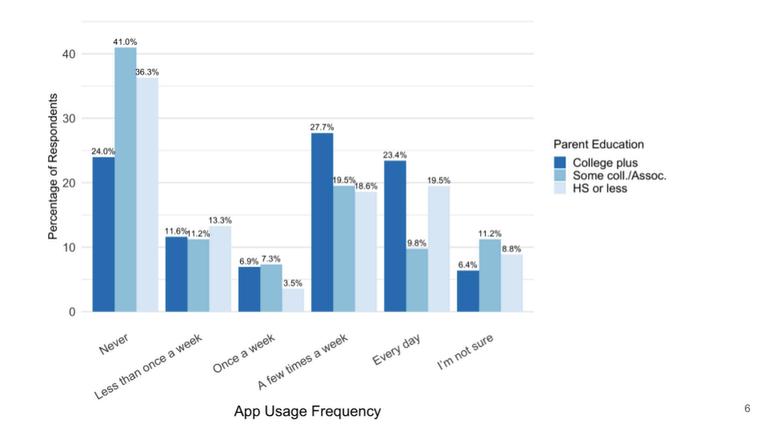
Adults see a mix of benefits and harms of AI for children.
Twenty-four percent of adults reported that the use of generative AI in education would lead to more benefit than harm; 31% reported more harm than benefit, and 35% saw an equal mix of benefit and harm (with 10% reporting that they were unsure)
When asked about the potential risks and opportunities generative AI would bring for children, adults were most likely to believe it would help children prepare for their future careers (37% responded “yes”) and most concerned that it would negatively impact children’s ability to solve problems independently (43% responded “yes”).
Parents of children under 17 were more optimistic about the benefits of generative AI for children’s education, health, and career readiness than other adults For example, 33% of parents believed generative AI would improve how children learn at school, compared to only 16% of adults who were not currently parents of 0-17 year old children Similarly, adults with higher levels of education were more optimistic about generative AI than those with lower levels of education. Over 40% of parents with a college degree believed generative AI would help children acquire skills needed for their future careers, while only 30-32% of parents with lower levels of education shared this belief.
When it comes to the use of generative AI tools in K-12 education, do you think there is generally…?
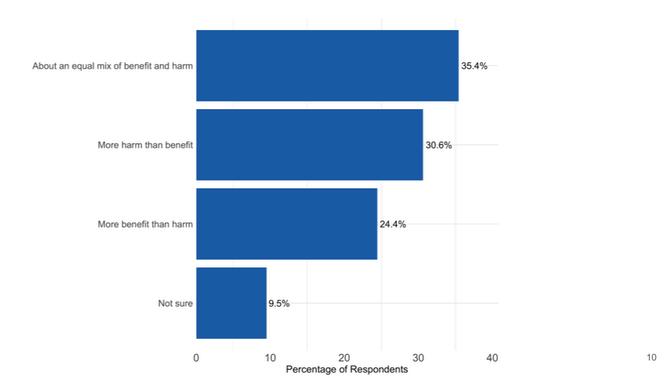
Generative AI will…
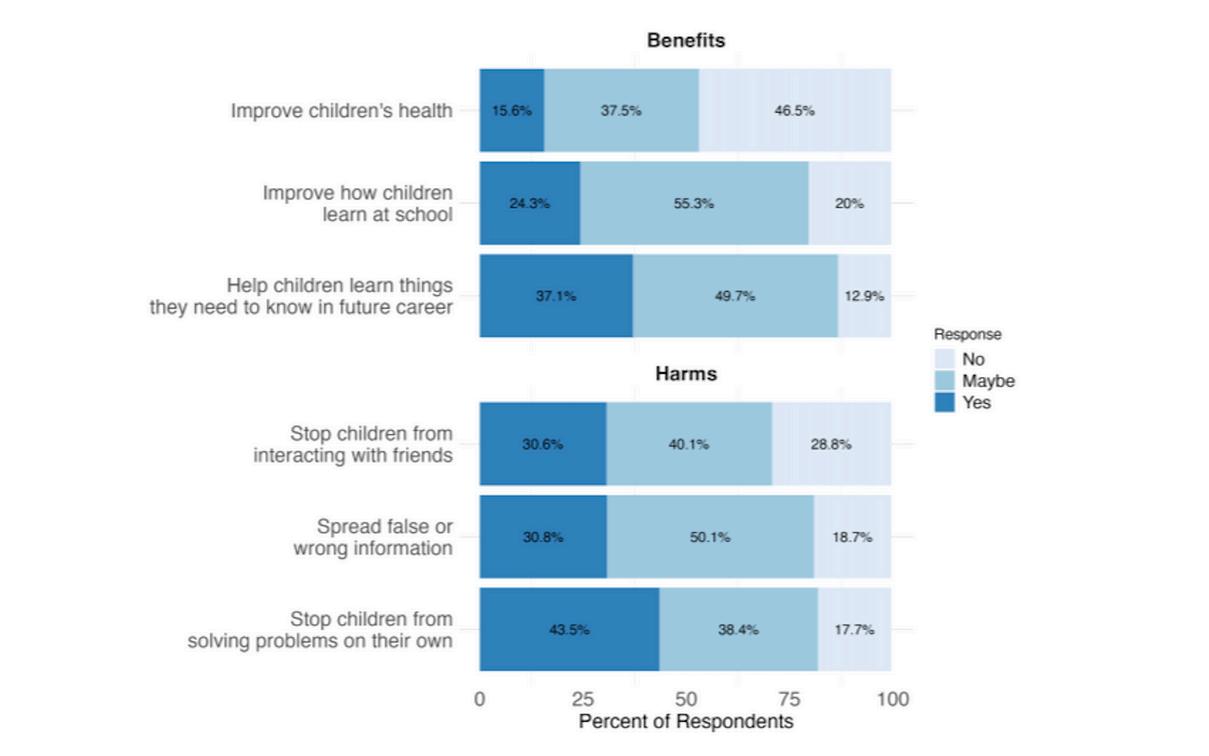
Generative AI will…
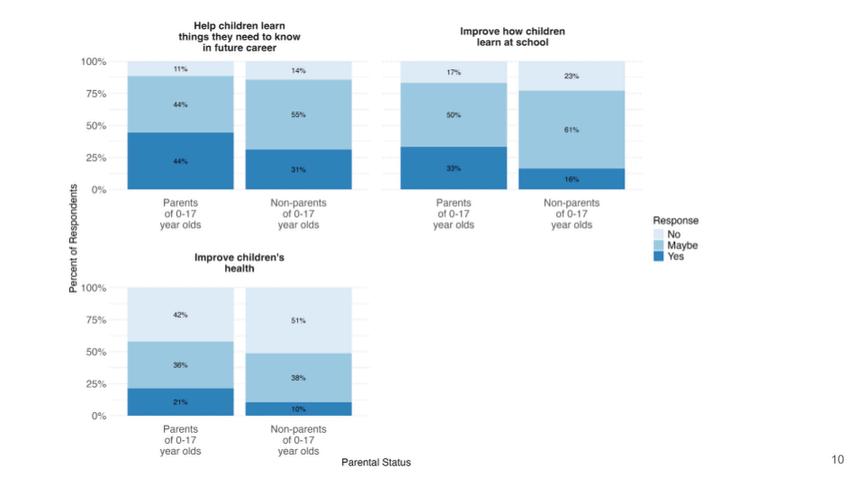

The use of AI tutors by children was widely perceived as cheating, whereas receiving help from humans was not.
Over 1 in 3 adults reported that they would consider it cheating if an AI tool reviewed a child’s schoolwork but only 1 in 10 adults viewed it as cheating if a peer, parent, or tutor reviewed the child’s work
In your opinion, is it cheating if...?

California adults, including parents, reported that they do not trust anyone — including the government, education systems, or Big Tech to regulate AI when it comes to their children.
Less than half of California adults reported having moderate to complete trust in local, state, or federal government, or in Big Tech companies, to make decisions about children and Al. In the absence of regulation, our children are being left in the hands of Big Tech.
Republicans expressed greater trust in the federal government and Big Tech to regulate AI than other parties Forty-four percent of Republicans reported moderate to complete trust in the federal government to regulate AI, compared to 32% of Democrats and 23% of Independents or those with other affiliations. Similarly, 48% of Republicans trusted Big Tech to regulate AI, while only 37% of Democrats and 27% of Independents shared this level of trust.
Republicans were also more optimistic about the application of AI in government, law, finance, and social media than other parties For instance, 77% of Republicans reported moderate to complete trust in the application of Al to detect inefficiency and waste in government spending compared to 57% of Democrats and 56% of Independents or those with other affiliations.
How much do you trust the following groups to make decisions about children and AI?

How much do you trust the following groups to make decisions about children and AI?
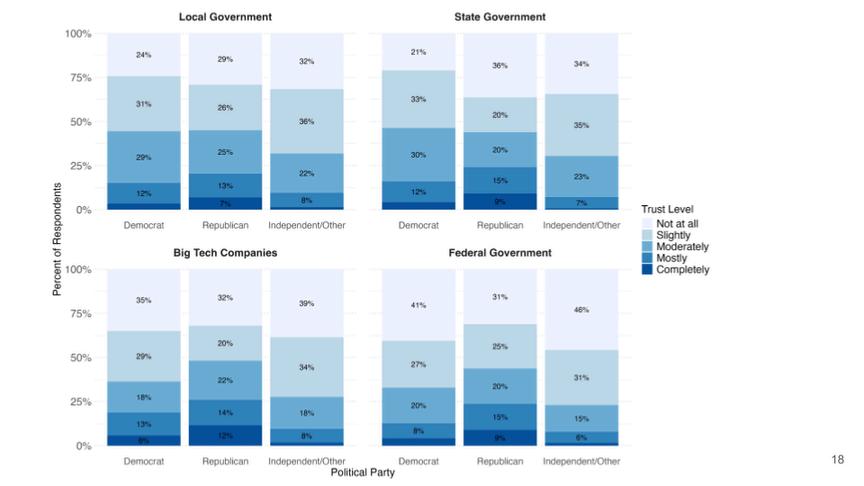
How much do you trust AI to be used effectively in the following areas?
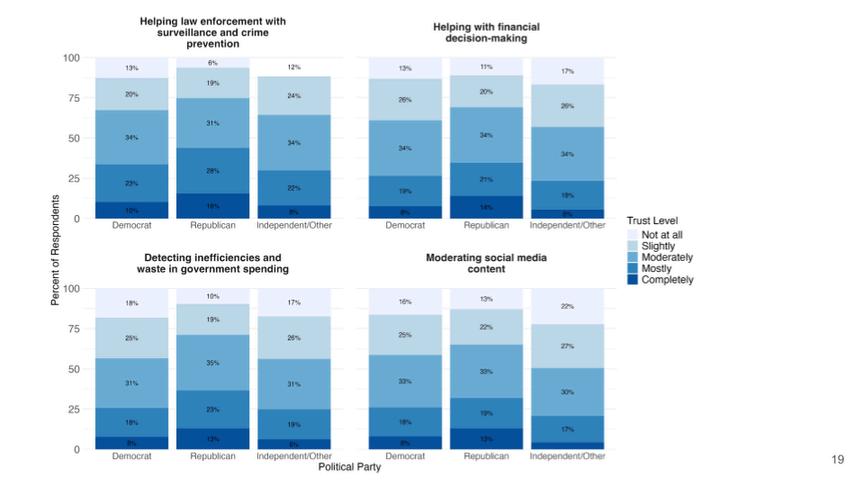
Younger generations of adults were more likely to express positive views about AI, and their children were more likely to use AI themselves.
Younger generations of adults were more optimistic about the opportunities generative AI offers for children, especially in areas such as career readiness and education, compared to other generations particularly Boomers and the Silent Generation For example, 40-41% of Gen Z, Millennials, and Gen X believed generative AI would help children acquire skills needed for their future careers, while only 20-29% of Baby Boomers and the Silent Generation shared this view.
Gen Z parents reported that their children used generative AI more frequently than children of Millennial and Gen X parents, with 41% indicating their children used generative AI a few times a week, compared to 26-27% of Millennial and Gen X parents This difference remained even after accounting for the children’s age

Generative AI will…
How often does your child use apps that answer questions or write text, like ChatGPT, Copilot, or Gemini in the home, classroom, or elsewhere?
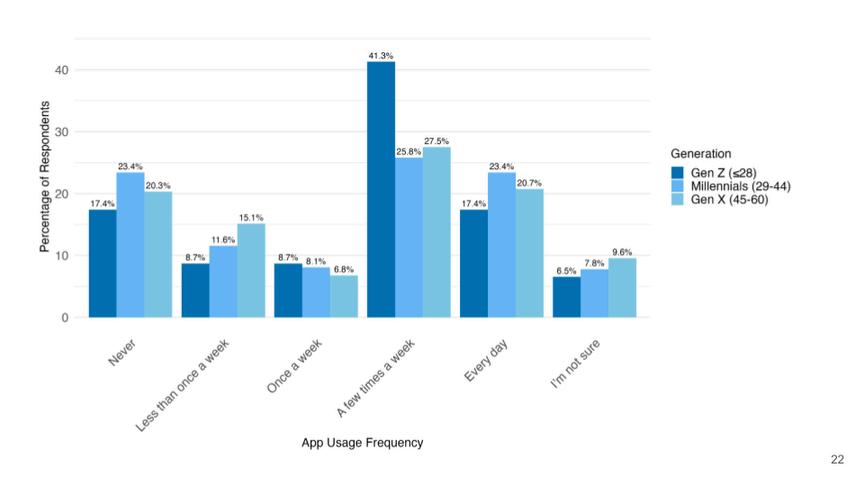
Our findings show that many Californians — especially parents of children aged 17 and under, younger adults, and those with higher education are open to the benefits of generative AI for children’s learning and future careers However, there are concerns about risks to children's problem-solving and academic integrity, and low trust in institutions to regulate AI effectively Children’s reported access to and use of generative Al also appears to vary based on parental education and resources with children in families with higher income, more parental education, and residing in urban environments having higher reported use of generative Al As these technologies become more integrated into children’s lives, clear policies, guidance, and safeguards are needed to ensure that all children benefit from generative AI safely and equitably.
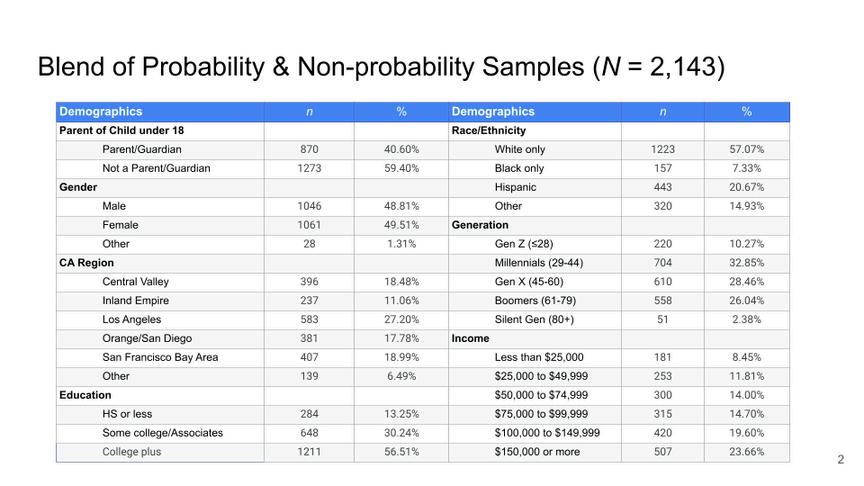
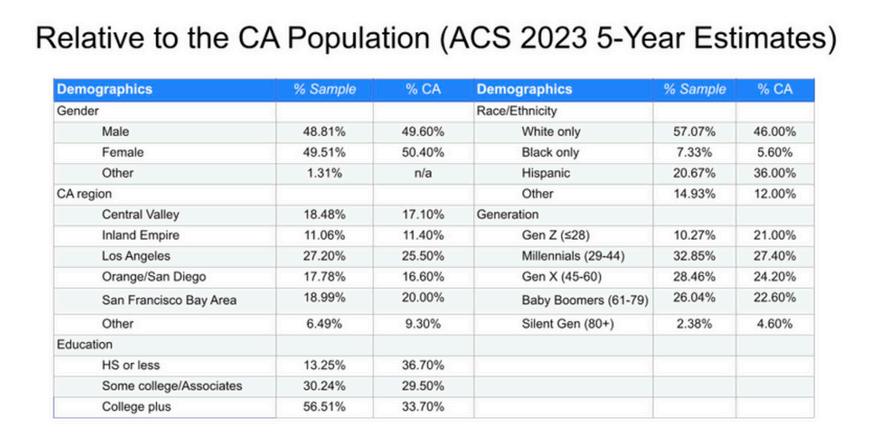
The sample was largely representative of the CA population, with the exception of an overrepresentation of college-educated, White, and non-Gen Z adults.
Contact: Nancy Lê, nancybl@uci.edu, (949) 824-4592
Media contact Mimi Ko Cruz
mkcruz@uciedu 949-824-1278

Sponsorship contact Stacy Skwarlo
sskwarlo@uciedu 949-824-0383
